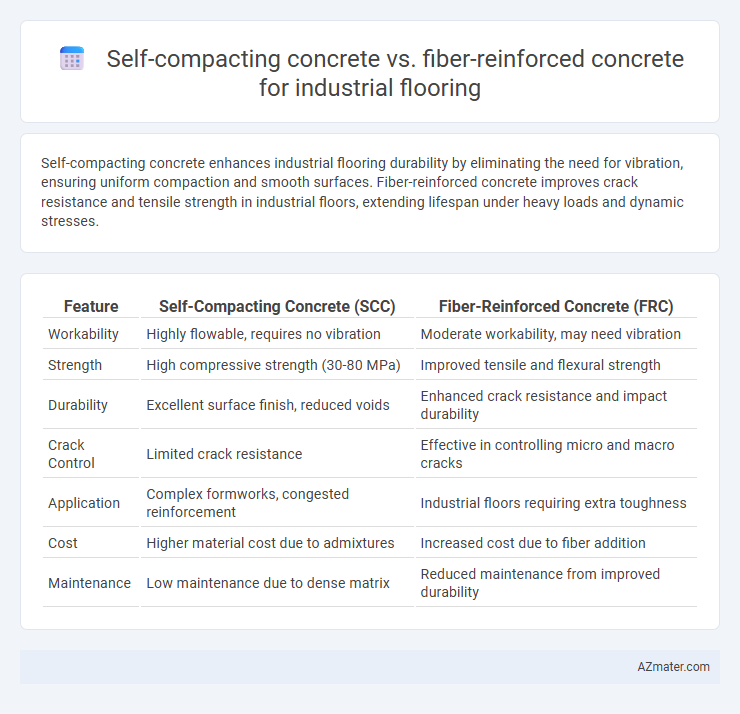Self-compacting concrete enhances industrial flooring durability by eliminating the need for vibration, ensuring uniform compaction and smooth surfaces. Fiber-reinforced concrete improves crack resistance and tensile strength in industrial floors, extending lifespan under heavy loads and dynamic stresses.
Table of Comparison
| Feature | Self-Compacting Concrete (SCC) | Fiber-Reinforced Concrete (FRC) |
|---|---|---|
| Workability | Highly flowable, requires no vibration | Moderate workability, may need vibration |
| Strength | High compressive strength (30-80 MPa) | Improved tensile and flexural strength |
| Durability | Excellent surface finish, reduced voids | Enhanced crack resistance and impact durability |
| Crack Control | Limited crack resistance | Effective in controlling micro and macro cracks |
| Application | Complex formworks, congested reinforcement | Industrial floors requiring extra toughness |
| Cost | Higher material cost due to admixtures | Increased cost due to fiber addition |
| Maintenance | Low maintenance due to dense matrix | Reduced maintenance from improved durability |
Introduction to Industrial Flooring Solutions
Self-compacting concrete (SCC) offers high fluidity and excellent surface finish, reducing labor costs and ensuring quick installation in industrial flooring applications. Fiber-reinforced concrete (FRC) enhances tensile strength and crack resistance, improving durability and impact resistance critical for heavy machinery environments. Both solutions optimize industrial flooring by balancing workability, strength, and long-term performance.
Overview of Self-Compacting Concrete (SCC)
Self-compacting concrete (SCC) is a highly flowable concrete type designed to spread into formwork and encapsulate reinforcements without mechanical vibration, ensuring uniform surface finish and structural integrity for industrial flooring. SCC enhances productivity by reducing labor and time costs while minimizing voids and honeycombing, which are critical for high-traffic, heavy-load applications commonly seen in industrial environments. Its superior workability combined with durability makes SCC ideal for industrial floors requiring fast installation and long-lasting performance under mechanical and chemical stresses.
Fundamentals of Fiber-Reinforced Concrete (FRC)
Fiber-Reinforced Concrete (FRC) improves the toughness and crack resistance of industrial flooring by incorporating discrete fibers such as steel, synthetic, or glass into the concrete mix, enhancing its post-cracking behavior and durability. These fibers help control shrinkage cracks and impact damage, making FRC ideal for areas subjected to heavy loads and dynamic stresses typical in industrial environments. Compared to self-compacting concrete, FRC offers superior mechanical performance and long-term resilience, critical for maintaining floor integrity under industrial use.
Key Properties: Workability and Placement
Self-compacting concrete offers superior workability due to its high flowability, enabling easy placement without mechanical vibration, which is ideal for complex industrial flooring layouts. Fiber-reinforced concrete enhances tensile strength and crack resistance but may require careful mixing and vibration to achieve uniform fiber distribution and adequate compaction. The choice between these concretes depends on balancing ease of placement with structural durability requirements in industrial flooring applications.
Strength and Durability Comparison
Self-compacting concrete (SCC) offers exceptional compressive strength and uniformity due to its high flowability, ensuring minimal voids and superior surface finish for industrial flooring. Fiber-reinforced concrete (FRC) enhances tensile strength, crack resistance, and impact durability through the inclusion of synthetic or steel fibers, making it ideal for high-load and dynamic industrial environments. Both SCC and FRC improve flooring lifespan, but SCC excels in structural uniformity while FRC provides superior toughness and resistance to mechanical stresses.
Crack Resistance and Shrinkage Control
Self-compacting concrete (SCC) offers superior uniformity and reduced voids, enhancing crack resistance and minimizing shrinkage due to its highly flowable mix design ideal for industrial flooring applications. Fiber-reinforced concrete (FRC) improves crack control by distributing tensile stresses through embedded synthetic or steel fibers, effectively reducing plastic shrinkage and drying shrinkage cracks in heavy-duty floors. Combining SCC with fiber reinforcement further optimizes durability, providing enhanced crack resistance and shrinkage control crucial for maintaining structural integrity in industrial environments.
Load-Bearing Capacity for Heavy Machinery
Self-compacting concrete offers superior load-bearing capacity for heavy machinery in industrial flooring due to its dense, homogeneous matrix that minimizes voids and enhances compressive strength. Fiber-reinforced concrete improves tensile strength and crack resistance, which contributes to durability but generally provides less compressive load-bearing capacity compared to self-compacting concrete. For industrial floors supporting heavy loads, the enhanced compressive strength of self-compacting concrete ensures greater structural integrity under continuous heavy machinery stress.
Installation Time and Labor Requirements
Self-compacting concrete reduces installation time significantly by eliminating the need for mechanical vibration, allowing for faster and more efficient placement in industrial flooring applications. Fiber-reinforced concrete, while requiring slightly more careful mixing and placement to ensure proper fiber distribution, enhances durability and reduces cracking without extensive labor for reinforcement placement. Both types minimize labor requirements compared to traditional concrete, but self-compacting concrete offers the greatest efficiency in rapid project completion.
Cost Analysis and Lifecycle Considerations
Self-compacting concrete (SCC) offers reduced labor costs due to its high flowability and ease of placement, while fiber-reinforced concrete (FRC) demands higher material costs from added fibers but enhances durability and reduces maintenance expenses. Lifecycle cost analysis reveals that although SCC lowers initial installation expenses, FRC's superior crack resistance and load-bearing capacity extend service life and minimize repair frequency in industrial flooring. Selecting between SCC and FRC depends on balancing upfront investment with long-term performance and maintenance savings for optimal cost-efficiency.
Recommended Applications and Best Practices
Self-compacting concrete (SCC) is ideal for industrial flooring requiring high flowability and excellent surface finish without mechanical vibration, making it suitable for complex forms and densely reinforced slabs. Fiber-reinforced concrete (FRC) enhances tensile strength and crack resistance, recommended for heavy-duty industrial floors subjected to high impact and abrasion, such as warehouses and manufacturing plants. Best practices include selecting SCC for rapid placement and minimal labor while specifying appropriate fiber type and dosage in FRC to optimize durability and load-bearing capacity.

Infographic: Self-compacting concrete vs Fiber-reinforced concrete for Industrial flooring
 azmater.com
azmater.com